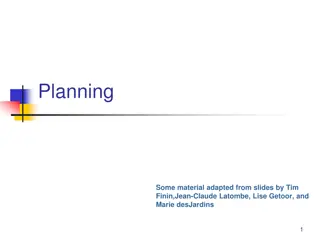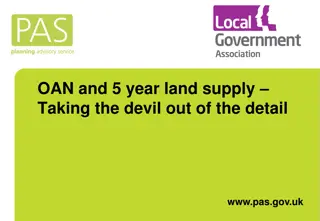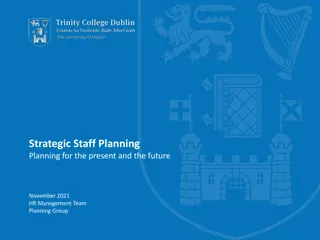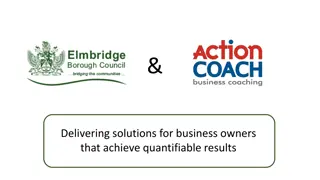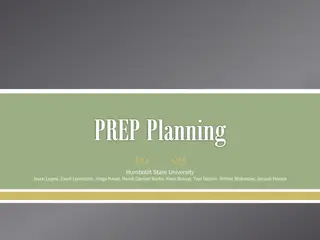Comprehensive Overview of Planning in Business Management
Planning in business management involves setting future courses of action to achieve predetermined goals expressed in quantitative terms. It is a rational approach that helps in decision-making, risk reduction, innovation promotion, and direction-providing, making it a crucial function at all management levels.
Uploaded on Oct 08, 2024 | 3 Views
Download Presentation

Please find below an Image/Link to download the presentation.
The content on the website is provided AS IS for your information and personal use only. It may not be sold, licensed, or shared on other websites without obtaining consent from the author.If you encounter any issues during the download, it is possible that the publisher has removed the file from their server.
You are allowed to download the files provided on this website for personal or commercial use, subject to the condition that they are used lawfully. All files are the property of their respective owners.
The content on the website is provided AS IS for your information and personal use only. It may not be sold, licensed, or shared on other websites without obtaining consent from the author.
E N D
Presentation Transcript
By ABHISHIKTH SANDEEP ABRAHAM M.Phil, M.Com, MA(Pub.Rel & Journl), MBA (HR),B.Ed, BCJ, ICWAI(I), PGDT, PGDCMP, Dip.Tax, CDT, UGC-NET,APSLET, (PhD),UGC-MAN Research Fellow Awardee in Devp. Studies
INTRODUCTION TO PLANNING A PLAN may be defined as A detailed statement of a future COURSE OF ACTION (COA) set about to achieve a pre determined objective/goal & expressed in quantitative terms ( in Qty/Amt/etc) CHARACTERISTICS: It provides a rational approach to achieve predetermined objectives It is a commitment to accomplish required actions to achieve a goal PLANNING: It is the process of preparing a plan DEFINATIONS OF PLANNING Deciding in advance WHAT,HOW,WHEN a task is to be done & by WHOM it is to be done.-It refers to THINKING IN ADVANCE (BY KOONTZ) Deciding in advance WHAT is to be done, and involves selection of objectives, policies, procedures, programmes, from amongst several alternatives. (BY HARLEY) Abhishikth Sandeep .A. A. B. 1. 2.
FEATURES OF PLANNING 1. PRIMARY FUNCTION OF MANAGEMENT: It is the first function performed by a manager. (Function of Primacy) 2. HELPS ACHIEVE OBJECTIVES: Once an objective is set, planning helps achieve it. 3. PERVASIVE: It is performed @ all levels of Mgt. & in all types of Org. 4. CONTINOUS: It is to be performed continuously (revised/reformulated) as the environment is dynamic & the Org. Has to keep pace with the changing business environment to sustain & face challenges 5. FUTURISTIC: It is related to actions to be taken in the future 6. INVOLVES DECISION MAKING: To accomplish a task, a number of alternative COA s may be available, Planning helps evaluate & identify the best alternative ,enabling decision making 7. MENTAL EXERCISE: It is related to preparing a blue print for action in advance , which calls for mental work (thinking) Abhishikth Sandeep .A.
IMPORTANCE FOR A BUSINESS Planning is needed to solve a problem or take advantage of a profitable situation. All activities are focussed towards the this end. PROVIDES DIRECTION: Business objectives are clearly defined- Planning helps focus all activities towards achieving it REDUCES RISK &UNCERTAINITY: Future is uncertain. In such a situation business actions are taken-Which is risky. Planning helps anticipate the future to a certain extent, thus helping the manager look ahead, anticipate change &decide in advance which tasks are to be performed. AVOIDS WASTEFUL EXPENDITURE: Planning puts an end to disorder & chaos (duplication & wasteful activities). It helps us perform only needed activities (eliminating redundant ones) PROMOTES INNOVATIVE IDEAS: During the process of planning, several alternative COA s are identified & their outcomes forecasted. This calls for the planner to think innovatively &discover alternatives Abhishikth Sandeep .A.
IMPORTANCE FOR A BUSINESS......Contd FACILITATES DECISION MAKING: It helps evaluate, choose & implement the best alternative to achieve a futuristic goal. Thus, facilitating effective decision making. ESTABLISHES STANDARDS FOR CONTROLLING: It helps lay down standards of doing a work (wrt.time ,cost,resources) When the actual work is performed, the work in progress at each stage is compared with the standards, thus enabling the manager get an idea weather he is on the right path to achieve the goal, else, initiate rectificationary action at an early stage. Planning sets the goals against which actual performance is compared. Planning is the pre-requisite for Controlling Abhishikth Sandeep .A.
LIMITATIONS OF PLANNING..... 1. CREATES RIGIDITY: As seen earlier, once standards are set ,managers tend to stick to them& adopt inflexible (rigid )approach. It becomes difficult to introduce changes /innovate on the approach. FACTORS CAUSING RIGIDITY: A. INTERNAL: These are organizational related. Eg: Org. Str, Org.Policies/ procedures etc. B. EXTERNAL: These are beyond the control of the Org. Eg: Political, Social, Economic, Technological environments, Competitor Policy etc. 2. NOT SUITED IN DYNAMIC ENVIRONMENT: Planning is based on futuristic assumptions which may /may not occur. Hence planning does not guarantee success in a dynamic environment. 3. REDUCES CREATIVITY: As work is directed towards achieving pre - determined standards, it discourages a manager from thinking of more innovative ways (Planning strangulates the initiative of a manager& compels him to work in an inflexible manner.) Abhishikth Sandeep .A.
LIMITATIONS OF PLANNING.contd 4. COSTLY &TIME CONSUMING: It is a lengthy, gigantic & cumbersome process- hence costly & time consuming. 5. NOT USEFUL TO DEAL WITH EMERGENCIES: Planning , being lengthy & time consuming delays action. Hence not useful to face sudden emergency situations. 6. MAKES A MANAGER CARELESS: Setting of standards (planned action) gives the manager a false sense of security ,making him careless & negligent, as he prefers to stick to the given plan. 7. PLANNING IS NOT A ONE STOP SOLUTION TO ALL PROBLEMS Abhishikth Sandeep .A.
Name the function to be performed by a manager before all other functions. 1. 2. Planning is undertaken to achieve organizational goals. True/ False.Give reasons in support of your answer. 3. Explain how planning reduces risk & uncertainity 4. Explain how rigidity is a limitation of planning. 5. How does Costs create a hurdle in the planning process? 6. Is planning worth the huge costs involved? Explain. 7. How does planning provide direction to the organization? 8. Though planning is an important tool in the hands of a manager,yet, it is not a remedy for all types of problems - Elaborate. 9. Why does planning fail sometimes despite the best efforts of the management? 10. State the main aspects in the concept of planning. Abhishikth Sandeep .A.
















